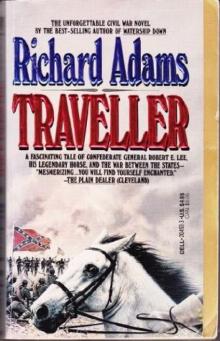- Home
- Richard Adams
Daniel Page 7
Daniel Read online
Page 7
Some time later, Ursula returned, laughed with surprise and pleasure to see her father and (this I have never forgotten) bent forward and gave me a kiss on the cheek by way of welcome.
I remember walking down the street with Mr. Miles, who persuaded the butcher to unlock his shop and sell us a leg of mutton for supper. I remember stripping with the boys to wash under the pump. As they knelt by their beds to say their prayers, Jim put an arm round my shoulders.
“Look,” he said to me, “I can imagine how strange everything here must seem to you, but nothing – nothing at all – is going to hurt you, all right? We’re your friends.” I shared his bed and slept soundly.
Oh, how often, during the years that followed, did I long to find myself back at home with that good Christian family! Although I could not know it, in all my life to come – until now, that is – I was never better off nor better treated than by them.
PART III
I suppose I must have stayed about a fortnight with Mr. Miles and his family. Yet in memory it always appears longer, so that I find myself unreflectingly thinking, “When I was with the Miles family we always used to ‘do this’ or ‘do that’; as though that “always” referred to a period of months. The fine summer weather, perhaps, had something to do with it, but far more the kindness with which they treated me. I had never been so warmly befriended nor enjoyed such consideration.
Of course they could have found fault with me on many a score; my table manners, my grubby hands, my illiteracy, my ignorance, my disagreeable habits, such as picking my nose, or spitting on my hands before setting about chopping wood or stooping to heave up a weight. But they never did. Suggestion or dint of example was the furthest they ever went, (“’Want to wash your hands for dinner, Dan?”) and they always behaved solicitously. At church on Sunday, when Jim saw that I couldn’t understand the prayer-book the sidesman had given me, he shut his own and kept as mum as I did; and slipped me one of his own farthings to put in the bag.
Mr. Miles was clearly enjoying his holiday from sea. He dug vegetables in the garden, read the newspaper, painted the house here and there, sat in the sun, visited friends in the village, went to the tavern and brought back quarts of beer for supper, and in the evening read to us from The Pilgrim’s Progress and Robinson Crusoe. He read well. This was a new experience for me and I enjoyed it.
On one occasion, he was away for most of the day “on business”, as he put it. He arrived home shortly before supper and confessed to having walked “quite enough”. The only one to know what he had been doing was Mrs. Miles, who asked him whether he had talked with “the lady” and hoped that all had gone well. In reply he tapped the side of his nose with his forefinger and said, “Could have been worse.” He ate a hearty meal and told us he reckoned he deserved it.
Later, instead of reading to us as usual, he asked me to come with him into the garden. I joined him on the seat under the cherry tree. When he had got his pipe going to his satisfaction, he said, “Well, Daniel, I’ve spent the day getting you what I hope will be a good job and a good place. You don’t have to take it if you don’t want to, but I reckon it’d suit you and you couldn’t do better. I’ll tell you a bit about it.
“A lot of rich ladies nowadays employ good-looking boys as their personal pages. A page has to attend on his mistress, you know; carry her things – her comb, scent, smelling salts, spare handkerchief — all that sort of thing, whatever she needs to have with her. Often he has to run errands, carry letters and so on. And to have a black page is considered very smart just now, because they’re not too easy to come by; reliable, well-behaved black boys, that is. Often, they’re dressed in smart uniforms. When a lady goes visiting, the page may be sent to wait in the servants’ hall; or she may want him to sit quiet in a corner of the room, to show how stylish she is. If she has her portrait painted, she may very well want the page put in the picture too, or so I’m told. Suggests riches, you see.
“Of course, it can be hard work. The page may be kept up half the night when his lady’s dancing or playing cards. But the thing is, it’s clean work and if the lady’s pleased with you, you may very well get a higher position as you grow up. What do you think of the idea?”
“Well, Mr. Miles,” I said, “it sounds fine to me. The only thing is, I’m a bit of a rough lad, as you know, not used to fine people or fine ways. I can’t even read or write, not properly —”
“That wouldn’t matter,” said he. “There’s plenty can’t — grown men, too. You could probably learn in your spare time. And if you take the trouble, you can soon mend your rough ways, as you call them. A cheerful, good-hearted boy, no fool, ready to take pains and set himself out to please; that’s what they look for. It’s well worth a try, anyway. And if you find it doesn’t suit you, you can always come back here.” He paused. “Well, Daniel, you think about it for a bit, while the Missus and I go out for a drop of beer. It’s entirely up to you. If you don’t fancy it I shan’t mind.”
When they returned, I told him I’d be happy to do my best. We went back to the seat under the cherry tree.
“The place I think I’ve found for you,” he said, “is with Lady Penelope Marston. She lives about fifteen miles from here, not far from Bath. She’s a wealthy widow. Sir James Marston died a year or two ago, and left her very well off. Her servants speak well of her – ‘say she’s a kind and not too-demanding mistress. Her housekeeper took me in to see her, and I thought she seemed a nice lady. I told her I’d bring you over this Thursday afternoon; that’ll give us time to get you ready, trim that stylish curly hair, see to your things and that. You’re all right for shoes, but you could do with another pair of stockings. A hat, too; you’re not respectable without a hat. A clasp knife might come in handy, and we’ll put a shilling or two in your pocket, just in case.”
“Will the lady pay me?” I asked.
Mr. Miles chuckled. “About five pounds a year, if you’re lucky. And that reminds me, Daniel. Never, never steal, d’you see? Never. For a servant in a rich house that’s always a terrible temptation. There’s servants been hanged for that. Well, you might not be hanged, but to be dismissed without a character, that’s fatal, that’s ruinous.”
We talked on for a while, and Mr. Miles gave me a lot more good advice. “And be sure you don’t quarrel with anyone,” he finished. “None of the other servants, I mean. You’ll almost certainly be the youngest, and you’re black into the bargain. So you must keep quiet, only speak when you’re spoken to and so on. Even if someone treats you badly, never show any resentment, and never make enemies.”
When we came back indoors, Mr. Miles told the family what he’d arranged. No one had a word to say against it.
“But we’re going to miss you, Daniel, that we are,” said Jim. And Ursula reduced me to tears by insisting on giving me her own little cross and chain to wear round my neck. I’ve still got it, as you can see. I’ve worn it all these years.
“You won’t forget us, will you?” said Dermot. And I never have.
* * *
I needn’t tell of all the preparations that were made for me next day. I realised that Mr. Miles was spending money on my account as if I was one of his own sons; but as before, he made light of it.
“It’s about time somebody laid out a few pennies on you, young Daniel,” he said. (I knew, of course, that it must be far more.) “I’m sure that one day, when you’re grown up, you’ll be able to do us a good turn in one way or another. We shan’t lose touch, you and I.”
“Is it far to go tomorrow?” I asked.
“About fifteen miles at the most, I reckon,” he replied. “Our neighbour Alec Williams is very kindly lending us his pony and trap. If the Lord only gives us a fine day it ought to be a nice little trip,”
“I’m going to miss Robinson Crusoe,” I said that evening, after he had read to us as usual. The truth was that I was going to miss a lot more than Robinson Crusoe.
“Only put your trust in the Lord, my boy,” said Mr. Mi
les. “He’s always with you, and if you’ll only trust Him, He’ll see you through thick and thin. You do believe that, don’t you?”
“It’s you that’s helped me to believe it,” I replied.
“Well,” he said. “Mrs, Miles and myself, we’ve both got confidence in you. Else, we wouldn’t be at the trouble; not that you’ve been any trouble, my lad. It’s only just my way of speaking, you know. We’ve all been only too happy to have you here with us.”
The next morning was as fine as anyone could wish. I put on the suit Foster had given me, and stood docile while the boys satisfied themselves about my hair, ears, fingernails and shoes. Mr. Williams obliged us by himself bringing round the pony and trap and after the most heartfelt thanks and farewells on my part, we drove away, with the family waving us out of sight.
Of course, this was the first time I had seen open country in England. What struck me most was its vivid greenness; the meadows on either side, with their placid, grazing cattle, interspersed with cornfields. In the distance lay the darker green of woodlands. Everything seemed peaceful, with a kind of stability and permanence. On me, it had a reassuring effect.
This, Mr. Miles told me, was the road to Bath, as old as the Romans of long ago. On this fine morning there was a good deal of traffic; carthorses pulling loaded wagons, horsemen riding clippety-clop and once or twice, lofty coaches, driven four-in-hand by imposing, top-hatted coachmen. It was exhilarating company.
A few miles outside Bath we turned off the high road and drove down dusty lanes, with leafy branches overhanging the way and here and there a ford where we stopped for our pony to drink. We passed through one or two villages, drowsy in the noontide heat, before pulling up at a tavern that met with the approval of the discriminating Mr. Miles. We took our bread-and-cheese and beer to a bench outside. There was hardly a sound except the pony’s gentle tearing at the grass, and the song of a bird. A farm boy, passing by on a donkey, gave us a friendly wave and called “Na, Darkie.”
“Not far now,” said Mr. Miles, as we set off again. He let the pony amble, and after no more than a mile or two pointed to a church tower half-hidden behind a belt of trees.
“Here we are, my lad – Clepton Saint Peter.”
We passed the church, and a little farther on, behind a pair of ornamental iron gates and a gravelled drive, saw facing us the most elegant house that I had ever seen. Its three storeys were built of dark-red brick, crowned by a cream-coloured cornice. On either side, lower wings extended slightly forward, so that they seemed as though guarding or attending upon the house itself. We turned first to the right, then left and crunched down a gravelled slope leading past one side of the house into a stable yard. Here I begged Mr. Miles to pull up.
“This isn’t – this surely isn’t — where we’re going, is it, Mr. Miles?” I was trembling.
“It certainly is, my boy,” he replied. “Clepton House.”
“And — and the lady lives here?”
“Lady Penelope Marston. She does indeed.”
“But you never told me.” I was panic-stricken, close to tears of dismay. “I never dreamt — it would be — be so grand; so far above me.”
“You’ve nothing to worry about, Daniel. I’ve been reliably told that the lady and her servants are good-hearted, decent people. They won’t treat you high-and-mighty. We’re not on your tobacco plantation now, you know. This is England, Come on, give me a smile. Think of your dear Dorothy. You and she both stood up to Reynolds, didn’t you? And these people are much, much nicer than Reynolds, believe me.”
I managed a lopsided smile.
“I got this opportunity for you because I know you can bring it off. You’ve been blessed with a nice disposition, Daniel. Give it a chance. Just be yourself.”
His warmth and kindness, and the thought of all he had done for me suppressed, if they did not altogether disperse, my trepidation.
As we got down a boy came running, took the pony’s head and led it away to a drinking trough in the shade.
Mr. Miles was about to knock when the door was opened by a plump, smiling woman, who evidently remembered him.
“Good afternoon, Mr. Miles,” she said, shaking hands. “So you’ve brought the young lad. Come in and sit down a while.”
I followed Mr. Miles into a bright, spacious kitchen.
“Sit down, both of you,” she said, pulling out a bench from under the table. “I expect you’ll be glad to cool off after your drive.” She brought each of us a glass of beer. “I expect you could eat a slice of plum cake, couldn’t you, young man?” she said to me.
“Thank you very kindly, ma’am,” I replied.
It was a generous slice, and I was barely halfway through it when a stout, sedate personage entered the kitchen, closed the door behind him and, as we both rose to our feet, looked at us in a grave, taciturn manner.
“Who are these people, Mrs. Beddoes?” he asked.
“This is Mr. Miles, a seafaring gentleman, Mr. Graydon,” she answered. “Mr. Miles, this is our butler, Mr. Graydon. Mr. Miles spoke with her ladyship on Monday while you were out visiting the wine merchants. He’s brought this lad he thinks may suit her ladyship as a page.”
“Ah, yes,” said he. “Now I recall her ladyship mentioning the matter. She has a visitor at the moment, but I’ll inform her that you’re here.”
As he left the kitchen, Mrs. Beddoes opened the door to the scullery. “You’ll want to have a quick wash, my boy.” She filled a bowl and gave me soap and a towel. I had just finished when the butler returned.
“Her ladyship wishes you to remain here,” he said to Mr. Miles, “while she talks with the boy. As for you, young fellow, come with me.”
I hadn’t been expecting that Mr. Miles would not be included, but there was no help for it. I followed the butler up a short flight of stairs, through a green baize door and along a corridor. At the further end he opened another door and took two or three steps beyond. I followed.
“This is the boy, your ladyship.”
He stood aside and gave me a gentle push forward.
The room was the largest I had ever seen in my life. In those days I didn’t know the words “palatial” or “overpowering”, but that was its effect on me. I don’t know how long I stood, struck dumb and bemused, before being led by the hand to a chair beside an open window.
Here, recovering my senses, I looked up, to find myself face-to-face with a gentleman who was looking at me with an amused but not unkindly expression. After a few moments he turned his head and said to someone behind him, “Well, that’s a fair start, anyway, Penny. He’s a good-looking lad. His appearance wouldn’t discredit you.”
He moved a little to one side, disclosing his companion beyond. She, I knew at once, could only be Lady Penelope Marston.
Just as I had said to Mr. Miles, my first feeling was that this was a person immeasurably far above me. I had never seen any woman like this before. Unconsciously, I had formed in my mind a picture of an elderly lady, grey-haired and rather severe-looking. So I was startled, for I could not have been more mistaken. In those days I had had little or no practice in guessing ladies’ ages; but at least I could see that this lady was young — twenty-six, perhaps, if that, and very good-looking. Her dark hair, falling to her shoulders, framed a most pleasant face: oval, with large, brown eyes, a rather long, straight nose, lips which lay slightly apart and an expression the very opposite of severe. Discriminating, certainly, but – what? Tolerant? Kindly? Something more, perhaps. Compassionate? What I mean is that as she looked at me I felt that in some extraordinary way she had absorbed my own feelings of nervousness and tension and dissolved them, as it were, in herself. Of course, I am speaking with hindsight, for I was to come to know Lady Penelope Marston almost as well as I had once known Doth or Missus Kathy. Yet now, even at this first look, her appearance reassured and calmed me. In a word, she put me at my ease.
“You’re not afraid of me, are you?” she said, smiling. “I don’t look frig
htening, do I?”
I could only smile and shake my head. She took a plate of sugared biscuits from the tea-table at her elbow.
“Have one of these and tell me your name.”
“My name is Daniel, your ladyship.” I ventured a bite at the biscuit.
“But have you another name? A family name?”
“I’m afraid not, your ladyship. Slaves don’t have family names.” (Crunch, crunch.)
“You’ve come from America?”
“Yes, your ladyship; from a big tobacco plantation in Virginia.”
“Mr. Miles and I had a talk the other day. He spoke well of you.”
“He’s been very kind to me, your ladyship.”
“And you want to be my page?”
“Very much, your ladyship.” (It seemed easy, now, to talk to her.)
“Have you had any experience of being a page?”
Suddenly, I had an inspiration. “Well, on the plantation, your ladyship, I worked as a personal messenger for Mr. Reynolds, the plantation owner.”
She smiled. “He was the big boss, was he?”
“Yes, your ladyship. It was a large place; a good mile across or more. Sometimes Mr. Reynolds would want a note carried to one of the other white men, or sometimes he just wanted me to tell one of them to come and talk with him.”
“Why do you want to be my page?”
“Well, Mr. Miles has told me all about the work, your ladyship. I like the sound of it and I believe I could do it to your satisfaction.”
She turned to the gentleman. “What do you think, Francis?”
“I suggest you take him for a week or two on trial, Penny. But look, my boy, you do understand, do you, that you have to be entirely committed to this job? All day and all night, if it’s required of you. Now, have you ever been in any sort of trouble? Been punished for doing wrong? It’ll be better if you tell the truth now. Have you ever stolen, for instance?”
“Never, sir. Mr. Miles will tell you the same. I’ve never been in any sort of trouble for wrongdoing.”

 Watership Down
Watership Down Tales From Watership Down
Tales From Watership Down Maia
Maia The Plague Dogs
The Plague Dogs Shardik
Shardik Traveller
Traveller The Girl in a Swing
The Girl in a Swing The Day Gone By
The Day Gone By Daniel
Daniel The Plague Dogs: A Novel
The Plague Dogs: A Novel